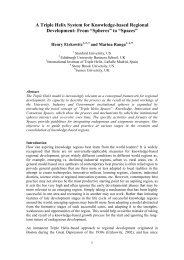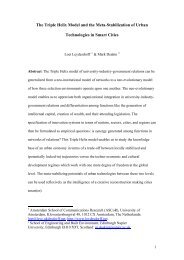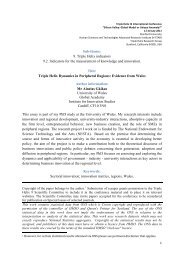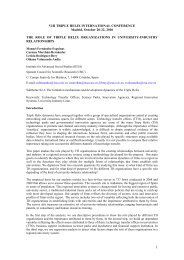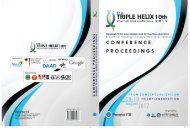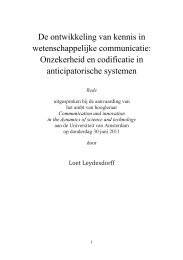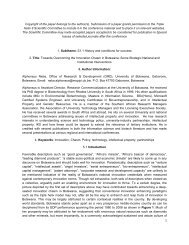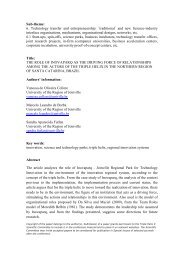TRIPLE HELIX noms.pmd
TRIPLE HELIX noms.pmd
TRIPLE HELIX noms.pmd
Create successful ePaper yourself
Turn your PDF publications into a flip-book with our unique Google optimized e-Paper software.
P-020Evaluating gendered evaluation procedures - a contribution to a newresearch culture? What can be learned for RTDI policy, science and theprivate sector.Sabine Mayer, Aliette Dörflinger, EvaHeckl, Austrian Institute für SME Research, Vienna - AustriaS5 «Government and public policy in the Triple Helix Era»Key words:Public policy and decision makinginnovation policy and gendergender bias in proposal selectiongender in researchnew research cultureIntroductionThe proposed paper will be based on the findings from the current evaluation of a new Austrian RTDI funding programme “LauraBassi Centres of Expertise” (LBC). It is named after the Italian physicist Laura Bassi, who in the 18th century became the firstwoman in history to be appointed as a professor at a European university.This initiative programme aims at equal opportunities for women in cooperative research, at establishing a new research culture,at offering new career options for all research personnel at LBCs. The call for proposals was open to all topics in the areas ofnatural science, technology and life sciences at the gateway between science and economy. Currently, eight LBCs in cooperationof science and industry are funded, all of them headed by female researchers.The initiative programme defines itself as a “learning initiative”. It tried to adopt new approaches to contribute to the abovementioned goals. The accompanying evaluation the paper is derived from analyses these new approaches in the light of theprogramme goals; according to the self-concept of the initiative programme, it has a strong focus on learning elements, thatinclude not only learning within the evaluated funding scheme itself but deliberately aims at the evaluation and identification ofprogramme elements that could be transferred to other RTDI-measures. In this sense, the initiative programme could also beconceived as a “teaching” programme. Hence, depending on the findings, the information gained from the programme and fromthe evaluation could also provide other research programmes with impetus for a more gender-equal design and increase thegender competence of the Austrian scientific community.State of the artTraditional selection processes focus on normative masculine career patterns when it comes to the review of the curricula andthe references. This has a strong implications on how scientific performance (i.a. “scientific excellence”) are measured and itopens the door to a potential gender bias in the selection procedure (Wenneras/Wold 1997; Bornmann 2007; Budden et al.2008), e.g. of research funding. Second strong factors that may influence the selection procedure are the presence of lessformal specifications in the tendering procedures, a lack of transparency and the prerogative of informal networking.The funding initiative LBC is – inter alia - based on the assumption, that proposal evaluation procedures ((extended) peer review;judging scientific quality on the basis of impact points), that are state of the art for proposal evaluation in most other fundinginitiatives that try to capture scientific excellence and other (structural) goals, do not contribute to gender equality and fail tocapture certain aspects of future research potential. This could be the organisation and management of the future LBCs, thatshould provide for more / better team work, a stronger role of science-industry collaboration (also in terms of cooperativedefinition of research agendas), but also innovative thinking through more openness and trans-disciplinarity, better careeropportunities by deliberate integration of human resource development in the centers´ management etc. Supposedly, both theresearch and the private sector partner should profit from a modern form of knowledge management involving reflective andactively structured collaboration.Therefore, the ex ante evaluation procedures for proposal selection in this initiative programme was designed differently in termsof criteria and processes, not only requiring qualifications which are gained during a traditional scientific career, but also takinginto account other skills and competences. The implementation of the new selection criteria and procedures aimed at creatinga new kind of research culture. This culture should enable to create working conditions and culture that allow men and womento have equally fulfilling careers as researchers in the areas of natural science, technology and life sciences at the gatewaybetween science and economy.Focus, methodologyThe paper will focus on the findings concerning the effects of the specific ex ante evaluation criteria and procedures for proposalselection adopted in the initiative programme LBC.The methodology will in general rely on qualitative approaches: interviews, focus groups and workshops targeting- the direct target group: the LBCs; persons responsible for proposals that were not granted funding; researchers that wereaddressed as target group by the programme management but decided not to submit a proposal- other collaborative research centers that are funded by different schemesMadrid, October 20, 21 & 22 - 2010222



